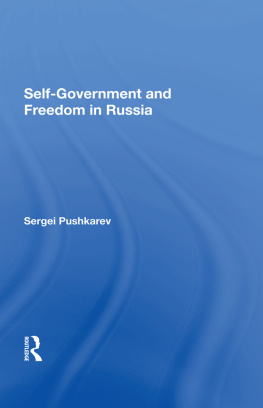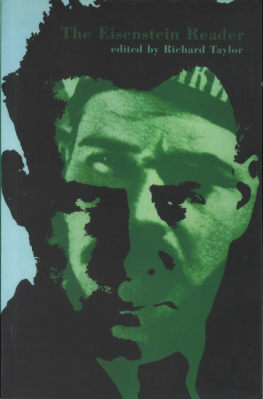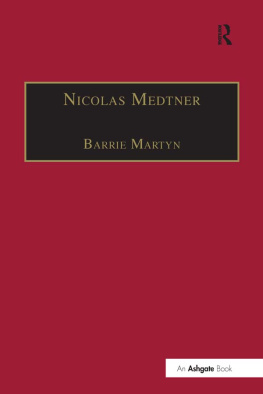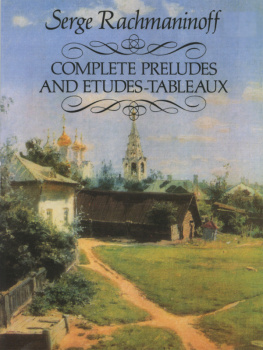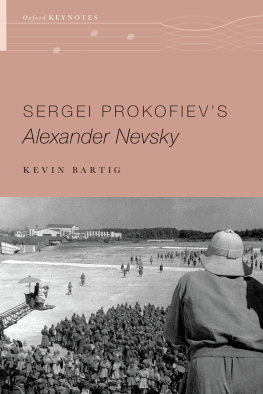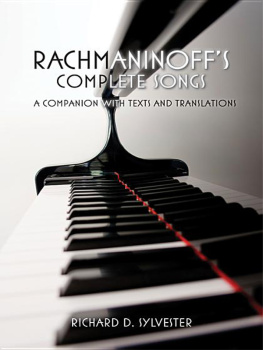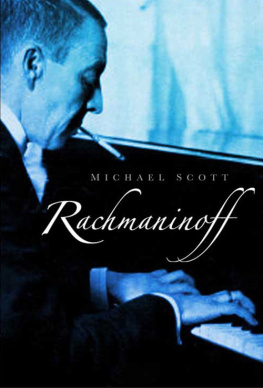
This edition is published by Muriwai Bookswww.pp-publishing.com
To join our mailing list for new titles or for issues with our books muriwaibooks@gmail.com
Or on Facebook
Text originally published in 1956 under the same title.
Muriwai Books 2017, all rights reserved. No part of this publication may be reproduced, stored in a retrieval system or transmitted by any means, electrical, mechanical or otherwise without the written permission of the copyright holder.
Publishers Note
Although in most cases we have retained the Authors original spelling and grammar to authentically reproduce the work of the Author and the original intent of such material, some additional notes and clarifications have been added for the modern readers benefit.
We have also made every effort to include all maps and illustrations of the original edition the limitations of formatting do not allow of including larger maps, we will upload as many of these maps as possible.
SERGEI RACHMANINOFF:
A LIFETIME IN MUSIC
BY
SERGEI BERTENSSON
AND
JAY LEYDA
WITH THE ASSISTANCE OF SOPHIA SATINA
TABLE OF CONTENTS
PREFACE
WITH a persistence that increased with age, Sergei Rachmaninoff devoted time and energy to the concealment of his personal life from all but a few intimates. His daughter, Irina Wolkonsky, says of his later years:
Father could be sociable only within a circle of intimate friends, and here, too, his sociability had a clearly defined limit that he neveror rarelypassed. This limit was plainly visible in all reference to his compositions. As for his emotions and inner feelings, he seldom articulated these in words. In general he was very stingy with words. This may be why he disliked interviews so much, and did all he could to avoid them. I remember well how he once said to someone in my presence that words are useless for such a purposethat all he felt and experienced was told far better, more clearly and truthfully in his compositions, and also found expression in his playing.
Those who love Rachmaninoffs music and respect his art may welcome our attempt to show his life as well as his career, even though this may seem to flout his wishes and habits. In view of Rachmaninoffs successful veiling of his private life, it may surprise the reader that there is so much to be said about it. His letters have been our chief source. We are lucky that so much of his private correspondence has been preserved; in the new Russian edition of his Letters there are nearly 500 letters through 1917, and the Rachmaninoff Archive in this country, to which many of his correspondents have contributed, contains almost as many letters from the second half of his life.
As for interviews and remembered conversations, is it necessary to remind ourselves that these are to be read with a grain of doubt? It might have been safer to discard all these as a source, but we hesitated to discard their grain of truth, too.
Dates in Part I of the book may present a problem to the reader who has grown up with only one calendar. Until 1918 Russians used the Julian calendar, which was twelve days behind our Gregorian calendar in the nineteenth century, and thirteen days behind in the twentieth century. Throughout Part I letters and events are dated only by the Russian calendar except when Rachmaninoff writes from abroad, when the foreign date (called new style) is used. On a few occasions, when there is the threat of further confusionas when Rachmaninoff leaves Europe in February and arrives in Russia in January!we give both dates.
Nor should Russian names alarm the reader; the difference between the appearance of given name and nickname is actually no greater than that of Robert and Bobby. Sergei becomes Seryozha and, more intimately, Seryozhenka, Natalia becomes Natasha and, at the end of a diminishing series, Natashechka. Sophia becomes Sonia, Sonichka, etc. AlexanderSasha. FyodorFedya. VladimirVolodya. YevgeniZhenichka. IrinaIrinochka. TatianaTania, Tanyushka. Formal address (the equivalent of our Mr. Rachmaninoff) is the given name and the patronymic together, thus: Sergei Vasilyevich; his sister would be addressed as Yelena Vasilyevna. There has been no effort to make the spelling of certain Russian names conform to correct English transliteration when they have become familiar to us in European forms, such as Rachmaninoff, Tchaikovsky, and Chaliapin.
To anticipate the wonder at encountering programs described as containing both orchestral and chamber music, it should be explained that, until the 1920s, Russian concerts maintained this older European custom.
Rachmaninoff never felt secure in the English language (a fact that must have contributed something to his natural stinginess with words) and was always reluctant to write in it. All his letters in English were either dictated by him in Russian or copied from drafts prepared for him. In Part II we have tried to indicate whether he wrote a letter in German or in French, sometimes by retaining his salutation in its original language.
Quoted sources, either in manuscript or in print, are traced in the notes, beginning on page 387. One source requires explanation. The text will give the reasons for Rachmaninoffs dislike of Oskar von Riesemanns biography, misnamed Rachmaninoffs Recollections (published in 1934 and copyright by Allen & Unwin Ltd.). As most of its biographical information was furnished by Sophia Satina, and often expanded by the biographer for arts sake, we have condensed as well as corrected quotation from this work. We are aware that this is not orthodox procedure, but we feel that this books accuracy has been thus increased in the least obtrusive way.
The title page contains an understatement. Sophia Satina did far more than assist us in writing this biography of her cousin and brother-in-law. Without her the book could literally not have been. With a person less sensitive to biographical problems or less conscientious on matters of fact, this account of Rachmaninoffs life could easily have taken on the superficial and dry form of an official biography, and if the reader finds something better than that, he has Miss Satina to thank. We, too, thank her, and through her we also thank the other helping members of her family: the late Mme. Natalia Rachmaninoff, who presented the Rachmaninoff Archive to the Library of Congress, and her daughters, Mme. Irina Wolkonsky and Mme. Tatiana Conus, whose permissions made possible our use of the Archive.
We have benefited by many other kindnesses: Alexander Aslanov, Nikolai Avierino, and Mrs. Dagmar Barclay gave us Rachmaninoff letters and reminiscences; Robert Russell Bennett and Mikhail Bukinik sent vivid memories to us; Mme. Maria Chaliapin allowed us to print her husbands correspondence with Rachmaninoff, as did Abram Chasins his correspondence; Henry Cowell and the late Olin Downes gave us tangible and moral assistance; Mme. Vera Fokina permitted us to use both sides of Michael Fokines working exchange with Rachmaninoff; Charles Foley and his staff helped; Mrs. Ossip Gabrilowitsch, Harry Glantz, and Mme. Olga Glazunova gave us permissions; both Edwin Franko Goldman and his son Richard provided new materials; Alexander Greiner (of Steinway & Sons) and Arthur Hirst permitted use of their Rachmaninoff documents; Josef Hofmann allowed us to quote liberally from letters sent to and received from the composer whom he calls the only Sergei; Mme. Nina Koshetz unselfishly permitted our use of letters that she had planned to print for the first time in her forthcoming memoirs; Miss Estelle Liebling and Nikolai Mandrovsky gave us permission to use letters exchanged with Rachmaninoff; Mme. Anna Medtner, Dimitri Mitropoulos, Benno Moiseiwitsch, Lawrence Morton, and Eugene Ormandy gave us various important permissions and assistance; Nikolai Rashevsky, Nadia Reisenberg, Joseph Reither (of the Rachmaninoff Society ), and Earl Robinson helped us; Nicolas Slonimsky, despite his reservations as to both subject and treatment of this biography, was extremely helpful; Mr. and Mrs. Eugene Somov not only allowed us the freedom of their long, privileged correspondence with Rachmaninoff, but also helped us in many less noticed ways; Michael Stillman added to our lists of works and records; Leopold Stokowski permitted quotation of his letters to Rachmaninoff, and Alfred J. Swan allowed our broad use of his invaluable reminiscences of the Rachmaninoff family, originally published in The Musical Quarterly ; Mrs. E. Tillett, Basil Verkholantzeff, Dr. John F. Williamson, Lady Jessie Wood, and Joseph Yasser gave us necessary permissions, and Mr. Yasser also contributed a great deal of his time, patience, and wisdom, and gave particular attention to problems offered by the First Symphony.
Next page

